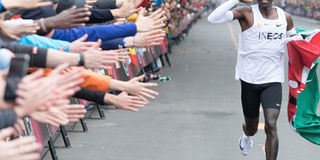Kipchoge proves that nothing is impossible

Kenya's Eliud Kipchoge celebrates after crossing the finish line at the end of his attempt to bust the mythical two-hour barrier for the marathon on October 12 2019 in Vienna. AFP PHOTO
What you need to know:
The issue: Kipchoge victory
Our view: The race can be difficult, more so without support from certain “pacesetters” such as the governments or sponsors, but Mr Kipchoge has shown that one needs to learn from their past and move on to better the future.
Eliud Kipchoge is obviously a fighter. Born in 1984, the athlete has had many ups and downs, many victories as well as failings and many hurdles to go through before he delivered the feat of running a marathon in under two hours in Vienna, Austria on October 12.
That marathon was not like others. It was not a competition and the rules usually set for such a run were not followed. Nevertheless, it was a feat to be celebrated. Away from the feat, Kipchoge’s wins and losses before that provide lessons for Ugandan athletes.
The Kenyan-born athlete began his running career 17 years ago, when he was 18 years old. He took off to a good start, succeeding in trial races in order to make it to main championships to represent his country. He won a number of those races, and where he did not win, he was among the top five.
Between 2004 and 2008, Mr Kipchoge got mostly silver and bronze medals, behind greats like Kenenisa Bekele. He was beaten by our Moses Kipsiro at the 5,000 metre Commonwealth Games in 2010. A day later, he run the Belgrade Race Through History where he ended up second, but in an amazing way, after having his shoe fall off in the first kilometre, putting it back on and gaining ground to get the silver medal.
The tide changed in 2016 when he won the London Marathon that took place in April. From then on, the runner went on to win most of the marathons he participated in, in some cases breaking records. Then on October 12, he run the marathon in one hour, 59 minutes and 40 seconds.
Mr Kipchoge shows that there will be many hurdles to beat before one gets to taste success, and this is what our athletes, including those who were pacemakers for him during the INEOS Challenge, have hopefully learnt. The path set ahead for them is filled with hurdles, some very difficult, some created by others and some of their own doing, some that no one really knows how to get over.
But giving up or heaping the blame on elsewhere, whether it is the government or not, is not the way to go. Mr Joshua Cheptegei has showed us the same as 2014 and part of 2015 were good years for him. Then 2015 to 2017 saw him take a hit, but he has lived to prove himself and the last three main championships.
The race can be difficult, more so without certain “pacesetters” such as the support from governments or sponsors, but Mr Kipchoge has shown that one needs to learn from their past and move on to better the future. It is possible.




